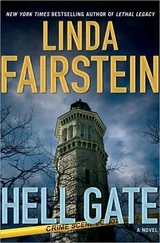“I waited half an hour. Tried her at home, in the car, at the gallery. No luck. Check with the maître d’ at Jean-Georges-I thought you would have done that by now. I must have tied up his phone for twenty minutes calling around to find Deni.”
“Were you upset? Call the police to look for her?”
“No, I suppose the maître d’ would also tell you I wasn’t very upset, so there’s no point pretending. Nothing from which a couple of martinis couldn’t distract me. I’d half expected she might stand me up that day. We’d had a bit of a tiff the week before.”
“Business?”
“Not business at all. And in retrospect, not exactly pleasure, either.” Wrenley looked me in the eye. “I told you when I met you the first time that Deni and I dated other people. Well, I ran into someone in Paris, a woman who’d been recently widowed and was doing the grand tour to announce that her mourning period was officially over. We spent a weekend together, which there was no need for Deni to find out about. Unfortunate coincidence, she turned out to be a friend of Deni’s.”
“Marina Sette?” Chapman asked.
“ Bravo, Detective! Forty-eight hours in a small hotel on the Left Bank, and tout New York seems to know all about it. I know Marina told Deni, and that’s what had her so mad at me. Deni didn’t mind what she didn’t know about, but Marina really pushed her nose into it.”
“Was it over between you and Deni?”
“Of course not. But it was cool, to say the least. She made a point of letting me know that she was spending a lot of time with Preston Mattox. But that was just to get back at me.”
“You don’t think she was in love with him?”
“Deni was an intensely physical creature, Ms. Cooper. She’d once made the mistake of telling me, when she was unusually giddy in the middle of a rather vigorous round of lovemaking, that there wasn’t enough Viagra in all the laboratories in the country to get Preston through another month of his relationship with Deni.”
Every time I was on the verge of liking her a bit more, I’d hear something that would cause me to take three mental giant steps in reverse. No point in exploring with Wrenley whether his rival had other redeeming features.
“When she didn’t show up at the restaurant for lunch and I couldn’t find out where she was, I thought that all she needed was some time to get over what I had done with Marina. She’d only graced me with the luncheon meeting because we had some business decisions to make and because she wouldn’t accept an evening date with me. She already had dinner plans with Mattox.” I didn’t think I had displayed any expression, but Wrenley looked from me to Mike. “Surely you knew that, didn’t you? Preston would have had more to worry about than I did when she didn’t show up for that date.
“I guess my trip down here wasn’t altogether useless,” Wrenley said. “I do hope you’ll give some thought to looking into why Lowell Caxton is in such a hurry to close his gallery.”
I had no intention of telling Wrenley what we would do next. “I’d suggest you let your lawyer go ahead with whatever action he thinks will protect your business interests as well.” I stood up to see him out. “Thanks for letting us know about it.”
“Do you still have any contact with Marina Sette?” Mike asked.
“Nothing directly. But I hear about her from time to time.”
“When’s the last time you saw her?”
“Couple of months ago.”
“She call you when she came to New York?”
“You mean yesterday?”
Chapman didn’t hesitate for a moment. “Yeah, yesterday.”
“No, but she called Bryan Daughtry. He told me that last night when he telephoned to let me know about Lowell Caxton. Bryan said that Marina had stopped by the new gallery on Twenty-second Street to see him. Probably to find out if he’d heard any rumors about whether Deni had left a will, or any instructions about who was to get which paintings.”
I thought she had told us she detested Daughtry. “Why did she go to him?”
“She could hardly go to Lowell, considering their relationship, and she wasn’t talking to me.”
“What did Bryan tell her?”
“That the only will he knew of was the original one Lowell’s lawyers had prepared for Deni when they first married. Like so many people her age, Deni thought she’d have all the time in the world to amend it. But Marina was still looking for her piece of the rock, what she thought was her ‘entitlement.’ She really believed, when their friendship was in full bloom, that she had convinced Deni to give her some of the Caxton heirlooms.”
“So Lowell gets it all?”
“I suppose. I mean-except for the handful of things that Deni bought with either Bryan or me. Her fortune all started with Lowell, didn’t it? In any event, Bryan just wanted me to know that Marina was bad-mouthing me, blaming me for her falling-out with Deni. And that she seemed frantic, out of control. Very hyper about something. That I should stay out of her way if she tried to see me.”
“Will you let me know if Marina Sette calls you?” I asked.
“Certainly, Miss Cooper. Thanks for your time.”
Chapman waited several seconds after Wrenley shook our hands and walked out the door. “Saddle up, blondie. Let’s see why Caxton’s heading for the hills.”
Mike parked the unmarked car illegally and threw his laminated police identification plate in the windshield. The Fuller Building was on the northeast corner of the intersection, with entrances on both Madison Avenue and Fifty-seventh Street. An eighteen-wheeler was parked in front of the side door in a large space protected by a red sign that announced no standing except trucks loading and unloading.
The lettering on the vehicle said Long Island Baking Potatoes, Bridgehampton, New York. It was definitely loading, and the cargo was not spuds.
There was a fine mist and I hurried to get inside the lobby. In addition to the two men standing at the rear of the truck, there was another person stationed inside the double doors whom I assumed to be part of Caxton’s security team.
“Recognize any of them?” I asked Chapman, hoping to get lucky and discover that some retired cops were on the payroll.
“Too ugly. Must’ve been Feds.”
The building was familiar to me because I’d been coming to the hairdresser there for almost ten years. With the exception of the Stella salon on the second floor and a handful of dental and medical offices, the structure was almost entirely leased by gallery owners. I knew that the eastern bank of elevators I used once a month went up only eighteen stories, so I led Mike to the western bank and pressed 35 to get to the top floor and the Caxton Gallery.
We stepped off onto an empty hallway. The glass doors of the space were covered by some kind of makeshift screening, and a note that said the gallery was closed. There was a telephone number to call for people making inquiries about exhibits and purchases.
Mike tried the brass handles on the entrance behind the temporary partitions, but they didn’t give. He knocked several times on the panels and the door was eventually opened by an unsmiling man in a dark suit.
“Lowell Caxton’s expecting us,” Mike said.
That brought a smile to one half of the man’s mouth. “Mr. Caxton is not here.”
“That’s strange.” Mike looked at me as though surprised and asked, “Didn’t he say today, at eleven o’clock?”
The man didn’t wait for me to answer. “He’s been called out of town unexpectedly. You can leave a message for him at this number.” He pointed to the paper that we had just seen.
“I’d like to leave a note for him. May I come in and-”
Читать дальше












